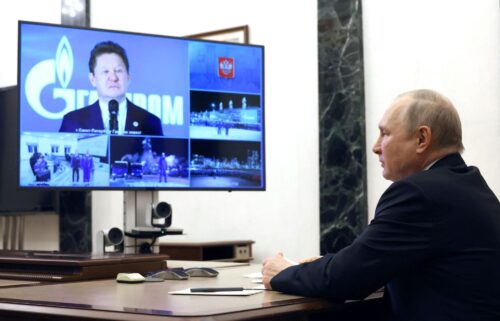
With Western sanctions piling up, the urgency is increasing for China and Russia to develop financial alternatives to the dominant dollar-Euro financial system. The RMB, while far from replacing the dollar, is slowly gaining traction as an international currency.
Over the past six months, the U.S. — with assists from the EU, Canada, and the U.K. — has sanctioned nearly 30 Chinese officials over actions in Xinjiang and Hong Kong. China, for its part, has responded with sanctions on over 60 individuals and a dozen entities in the U.S., the EU, Canada, and the U.K.
The highest-profile sanctionee, Hong Kong Chief Executive Carrie Lam (林鄭月娥 Lín Zhèng Yuè’é), has taken to stockpiling cash after finding herself unable to access the global banking system.
The recent round of sanctions, and the specter of a U.S.-China decoupling spiral, have elevated RMB internationalization from nice to have to need to have. If China is unable to increase the cross-border use of its currency — and thus, continues to be highly exposed to the Western-dominated global financial system — vast swathes of its commercial activity could be left at the mercy of increasingly adversarial competitors. On the flip side, a more globally accessible RMB could significantly alter global power dynamics.
China isn’t alone in its interest in moving away from the Western-dominated financial order. Indeed, Russian Foreign Minister Sergey Lavrov recently told Chinese media that Russia and China need to “reduce sanctions risks…by switching to payments in national currencies and in world currencies alternative to the dollar.”
Lavrov’s got a point.
The Bretton Woods legacy financial order that exists today is both unrepresentative and highly inelastic. The U.S., Canada, the EU, and the U.K., whose currencies account for 84% of global trade, make up just 35% of global GDP and 10% of the global population. In the real economy, if the price of Coca-Cola goes up — or if one dislikes the company’s politics — one can buy Pepsi. In the global financial system, there is no Pepsi.
The alternative system that Lavrov and others, like former People’s Bank of China governor Zhōu Xiǎochuān 周小川, describe with wistful urgency deeply threatens the West’s most potent non-military power piece: currency.
And China is the only country remotely capable of building such a system.
To be clear, internationalization of China’s currency — known as either the renminbi (RMB) or the yuan — does not mean the RMB replaces the dollar-Euro order. A slightly more globalized RMB doesn’t really give China the power to set meaningful sanctions, but it could severely blunt the power of Western sanctions. At present, what China and many other countries want is insurance — a parallel system that operates outside the asymmetric status quo. To achieve that, the RMB needs critical mass.
Were China able to bump the RMB’s use in global trade and as a reserve asset to, for example, 10% and 10%, respectively — up from current levels of 2.5% each — it could create a semi-viable parallel financial system.
There are three keys to getting there:
- Developing relatively liquid RMB investment opportunities
- Developing supporting payments infrastructure
- Getting others on board
Without access to RMB-denominated investment opportunities, the RMB is a hard sell. In reality, China has plenty of room to open up its markets at home and abroad without destabilizing its financial system. Foreigners, for example, hold 30% and 25% of American bonds and stocks, respectively. Those numbers are only 3% and 4.5% — albeit rising — in China. The coming surge in green finance and the prospect of increased RMB use in international development, including through the Chinese-led AIIB, offer pathways for China to increase cross-border use of the RMB without compromising on Beijing’s policy goals. However, all of this does mean allowing the RMB to appreciate, which will — today as ever before — be a tough pill for the export sector to swallow. Such concerns, however, lose viability in a need-to-have world. Plus, if China is serious about a dual-circulation strategy focused on domestic consumption, a rising RMB is not only a positive, but also required.
There is also the matter of infrastructure. Sanctions are made possible by the West’s veritable control of and ability to peer into the global payments system. While China does have its own cross-border payments alternative to SWIFT, the much-hyped digital RMB (a.k.a. digital yuan) is the most important story on this front. A digital RMB would completely bypass Western systems and, perhaps more significantly, won’t require a bank account, meaning that financial institutions will be spared the ever-present fear of violating Western sanctions — and that Carrie Lam can once again go cashless. The digital RMB, still in testing in select regions in mainland China, hasn’t yet spent much time outside the country, but trials are underway with Hong Kong and Thailand and the UAE.
The big question: Is there an appetite for a global RMB?
The answer: Absolutely.
On the market front, as evidenced by the foreign capital investment boom in China, there is clearly a desire to invest in RMB assets.
On the geopolitical front, Russia has been the most vocal advocate. Hit by a deluge of sanctions, including some of the most forceful yet announced just today, Russia has already dropped its use of the dollar in trade with China to 46% of all transactions, down from 90% in 2015. Iran, under U.S. sanctions for four decades, is another obvious participant. Pakistan, another. China-leaning BRI governments with tense and relatively inconsequential relations with the West — Myanmar, Angola, and several Central Asian states, for example — are also likely partners. And, as critical mass develops, the attractiveness and ease of contracting in RMB only grows.
In such an environment, Iran and North Korea may find it much easier to enrich uranium, Russia to annex neighbors, China to build reeducation camps. Without the stick of finance, the U.S. may resort to other tactics to impose conditionality. How the reader feels about all of this will surely depend on where they sit.
Simply put: An even mildly internationalized RMB could significantly undercut Western financial prowess. The powerful, uneven relationship between finance and geopolitics, evident in the recent rounds of sanctions, would begin to unravel. And, frankly, if — a big if — China is able to develop reasonably liquid markets and streamline the digital RMB, there is little the U.S. and Europe can do about it.
With each round of sanctions, this outcome grows nearer.






